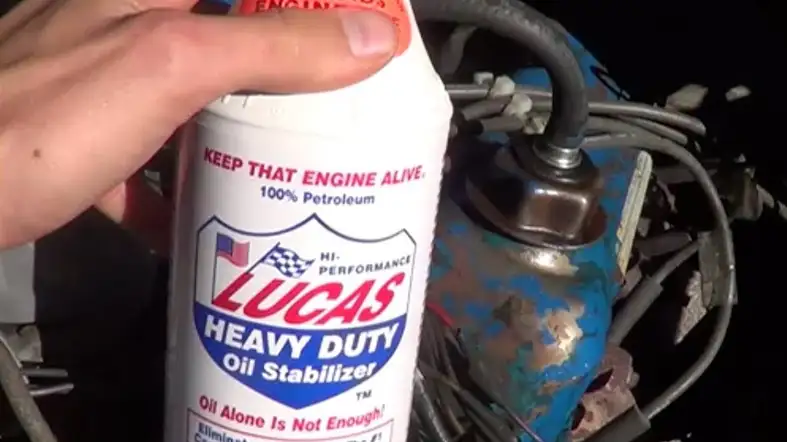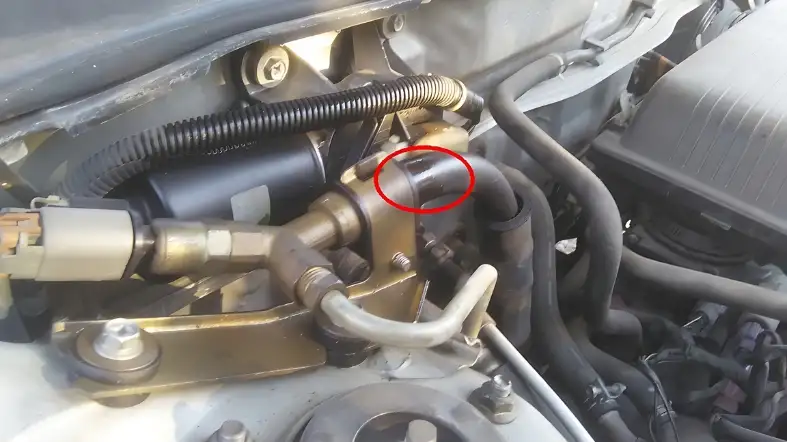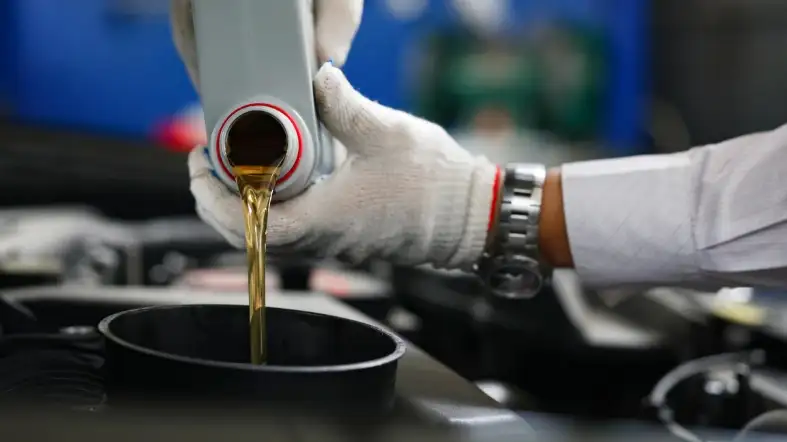Are you puzzled about which Lucas Oil Stabilizer to choose? With so many options available, it can be overwhelming to make the right decision.
But worry not! In this blog post, we will delve into the various Lucas Oil Stabilizers and help you find the perfect one for your needs.

Which Lucas Oil Stabilizer Should I Use?
For optimal results, it is recommended to use Lucas Heavy Duty Oil Stabilizer. Its advanced formula enhances oil performance, reduces friction, and extends engine life. Give your vehicle the ultimate protection it deserves with Lucas Heavy Duty Oil Stabilizer.
Ideal Lucas Oil Stabilizers List:
| Specific Purpose | Ideal Locus Oil Stabilizer |
|---|---|
| Diesel and Gasoline Engines | Lucas 10001 Heavy Duty 1 Quart Stabilizer |
| Synthetic Oil Stabilizer | Lucas 10131 Pure 1 Gallon Synthetic Oil Stabilizer |
| High Mileage Engines | LUCAS OIL 32-Ounce High Mileage Oil Stabilizer |
| Engine Oil Stop Leak | Lucas Oil 10279 1 Gallon Engine Oil Stop Leak |
| Hydraulic Oil Booster and Stop Leak | LUCAS 10018 1 Gallon Hydraulic Oil Booster and Stop Leak |
| Fuel Treatment | Lucas 10303 32-Ounce Fuel Stabilizer |
Types of Lucas Oil Stabilizers and Their Usage:
Lucas Oil Stabilizers can be used on engines, power steering systems, differentials, transmissions, etc.
To ensure peak performance and value your investment, Lucas Oil Stabilizers come in several varieties for a variety of purposes, such as:
1. Heavy-Duty Oil Stabilizers:
These stabilizers are used in both diesel and gasoline engines. It helps to boost horsepower, decrease friction, as well as enhance fuel efficiency.
2. High-Mileage Oil Stabilizer:
This oil additive is made to help high-mileage engines last longer by reducing wear and tear.
It is specially developed to make older engines function more smoothly. So, it works by lowering friction, enhancing fuel efficiency, and guarding against thermal breakdown
3. Power Steering Stop Leak:

This kind of stabilizer is used in power steering systems to prevent leaks. It can also lessen vibration and liquid usage.
4. Fuel Treatment:
This kind of stabilizer is made to grease fuel pump components and injectors, cleanse injectors as well as the carburetors.
It shields the fuel pipeline from oxidation and sediments.
5. Hydraulic Oil Booster & Stop Leak:
Stopping leaks and boosting the pressure of hydraulics in hydraulic lines are the two goals of this specific type of stabilizer.
It functions well with the hydraulic systems used in tractors, construction machines, and manufacturing machinery.
6. Transmission Additive:
This kind of stabilizer is made to make shifting more comfortable and to lessen the effects of heat and strain on the gearbox.
Additionally, it may aid in extending the transmission lifespan.
In order to guarantee the best performance and protection, it’s critical to choose the appropriate Lucas Oil Stabilizer for your unique application.
So, let’s find out which one actually suits your needs the most.
Find The Ideal Stabilizer for You:

Leaving behind all the “this and that”, we will now find out what sort of stabilizer to use for what sorts of engines.
Diesel and Gasoline engines:
If you are looking for a Lucas oil stabilizer to use generally on gasoline, diesel or high-performance engines, there is no better alternative than the Lucas 10001 Heavy Duty 1 Quart Stabilizer.
Lucas Heavy Duty Oil Stabilizer is intended to lessen wear and tear and oil usage in heavy-duty engines.
It is a synthetic mixture of petroleum base oils and many additives designed to enhance the functionality of the oil in the engine.
The oil stabilizer thickens the oil to lessen the contact between metals inside the engine.
As a result, there is less wear and tear, temperatures, and stress on engine parts, which might end up in an extended engine lifespan and better performance.
It is suitable with conventional oil and synthetic oils and also suits fine with older and new engines.
All things considered, it is a fantastic option for anyone wishing to extend the life and performance of their heavy-duty engine.
Pros:
- 100% petroleum-based
- Reduces sluggish starts.
- Minimizes friction to increase power, increase fuel efficiency.
- The beginning is simpler at any level of heat.
- Reduces pollutants and contamination of oil.
- won’t discolor or slime.
- Safeguards against rusting and corrosion.
- Prevents the leakage of oil. Enhances oil viscosity.
- Decreases the use of oil.
- Improves engine longevity.
- Minimizes engine noise.
- Ensures that power regulators are completely lubricated.
Cons:
- A pricy option.
- May not be suitable for lighter oil.
Synthetic Oil Stabilizer:
If you are looking for a stabilizer for Pure Synthetic Oil or any sort of lighter engine oils, you rest easy that Lucas 10131 Pure 1 Gallon Synthetic Oil Stabilizer will be your perfect match.
This is a sophisticated synthetic oil supplementary, that is used to lower friction, wear and tear, and heat produced by the engine.
It includes a special mixture of synthetic base oils plus a significant amount of Lucas’ special additive package.
In combination, it works to shield your vehicle’s engine from accelerated wear, thus increasing oil life, and boosting fuel economy.
It was specifically engineered for use in the racing sector, for improved torque and MPG, as those motors use lighter oil.
So, it is an educated guess that one can use Lucas Pure Synthetic Oil Stabilizer with both synthetic and non-synthetic oils as long as the oil in question is light.
This oil comes with a stronger outer layer for toughness that withstands extreme temperatures, excessive RPMs and stresses under harsh circumstances.
So, naturally, it is thin, smooth, and long-lasting, and thus works best when used with lighter oils.
According to Lucas Oil, you have to pour in 1 quart of the stabilizer for every 4 quarts of engine oil to utilize it in the best way possible.
By doing so, the density of the oil will be increased and its capability to grease the components of engines will be improved, resulting in a decrease in breakdowns.
All things considered, Lucas 10131 Pure 1 Gallon Synthetic Oil Stabilizer is a fantastic option for anyone wishing to safeguard their engine and prolong oil replacement intervals.
It has been extensively tried out in numerous engines and confirmed to function well in each one.
So, as time passes, it will assist customers save money on service and repair expenditures.
Pros:
- Almost completely prevents dry starts and unnecessary wear.
- Used in both diesel as well as gasoline engines.
- Appropriate for all motor oil grades, both traditional and synthetic.
- Reduces pollutants and contamination of the oil by slowing blow-by.
- Won’t void the warranty for new vehicles.
- Increases fuel and engine lifespan.
- decreases the oil’s temperature and stabilizes pressure in the oil.
- Decreases leaks, smoke, and knocking.
- Ideal for the Powerstroke engines of Ford.
Cons:
- Not compatible with heavy-duty oils.
- Has potentially hazardous substances.
High Mileage Engines:
To satisfy your endeavor for high mileage engines, LUCAS OIL 32-Ounce High Mileage Oil Stabilizer does miracles.
High mileage engines—often referred to as engines with more than 75,000 miles—are the intended engines to be treated by LUCAS OIL High Mileage Oil Stabilizer.
The majority of petrol and diesel engines, found in cars, trucks, motorbikes, and other vehicles, are functional with it.
Seal conditioners are part of the formula for high mileage. By avoiding leaks and enhancing the adaptability of engine seals, it can aid in lowering oil consumption.
Moreover, by creating a layer of protection between metal surfaces and lowering heat and friction, the stabilizer’s friction modifiers can aid in minimizing engine wear.
Remember that the manufacturer’s recommendations should be strictly followed, though, as excessive use might harm engines, which is true of any oil stabilizer or additive.
Pros:
- Reduces wear on vital engine parts.
- Extends the lifespan of the engine.
- Reduces engine friction.
- Increases fuel efficiency.
- Aids in stopping leaks and seal deterioration.
- Offers superior protection against corrosion.
- Enhances the durability and thickness of the oil film.
- Lowers oil consumption and associated expenses.
- Maintains the smooth operation of your engine.
Cons:
- May not be suitable with synthetic oils.
- Costly option.
Engine Oil Stop Leak:
When the search is for a specially created additive that aids in stopping and preventing engine oil leaks, your go-to option shall be the Lucas Oil 10279 1 Gallon Engine Oil Stop Leak.
This product’s a special mixture of petroleum-based compounds. It can restore and maintain worn-out or outdated gaskets, seals, and O-rings.
It aids in bringing them back to their natural state of flexibility and form, which can aid in stopping any future leaks.
Pros:
- Suitable for petroleum-based, synthetic, and semi-synthetic motor oils.
- Regenerates damaged seals.
- Stop the seals from being exposed to corrosion.
- Raises the pressure of oil.
- Decreases noise from the engine.
- Decreases oil consumption.
- Has no hazardous solvents.
Cons:
- Not suitable for all leaks.
Hydraulic Oil Booster and Stop Leak:
For your hydraulic system, you need the LUCAS 10018 1 Gallon Hydraulic Oil Booster and Stop Leaks.
It is a uniquely developed hydraulic oil additive that is intended to eliminate leaks and lessen downtime brought on by hydraulic system problems.
It has a combination of premium petroleum-based oils and chemicals that boost hydraulic systems’ efficiency and dependability.
All forms of hydraulic equipment, for example, those of machinery used in construction, agriculture, and industry, can use this device.
Pros:
- Raises the viscosity factor of hydraulic fluids.
- Is appropriate for usage with a variety of hydraulic systems.
- Improves performance to a great extent.
- Aids in the prevention and sealing of small hydraulic system leaks.
- Improves productivity while decreasing downtime.
- Elements of hydraulic systems are safeguarded and given an extended lifespan by anti-wear chemicals and lubricants.
Cons:
- Not suitable for light oil.
Fuel Treatment:
If you’re searching for something to stop petrol and diesel fuels from going rotten while being stored, you can invest your money in this renowned fuel treatment of Lucas Oil, Lucas 10303 32-Ounce Fuel Stabilizer.
The stabilizer works by stopping the growth of gum, paint, and oxidation in the fuel system, and thus it can keep the oil fresh for up to 12-14 months.
Additionally, it has an anti-corrosion agent that guards against rust and corrosion for the metal parts of the fuel system.
Pros:
- Stops fuel from oxidizing.
- Provides corrosion protection.
- Improves engine efficiency.
- Extends the life of gasoline stored.
- Helps you avoid paying for replacement fuel frequently, saving you money.
Cons:
- Takes up storage space.
- Negative effects on the environment
Precautions: Before choosing any oil addition, it is also usually advisable to double-check the directions provided by the manufacturer or speak with a qualified mechanic.
They can assist you in selecting the best product that meets the demands of your vehicle specifically and guarantee that it won’t result in any potential harm or nullify the warranty on your automobile.
FAQs:
What Function Does Lucas Oil Stabilizer Serve?
Lucas oil stabilizer is made to stop oil breakdown, lessen engine wear, and increase engine longevity.
It functions by incorporating a high-quality lubricant into your engine oil.
It works by allowing the engine to straighten down unwanted rough places and shields it from wear and tear brought on by both heat and friction.
How Should I Use Lucas Oil Stabilizer?
At your subsequent oil change, you just need to add the required amount of Lucas oil stabilizer to your motor oil.
Before introducing the stabilizer to the oil, make sure to review the directions carefully.
The amount of stabilizer you require will vary on the size of your vehicle’s engine and what specific stabilizer you are currently utilizing.
Is Lucas Oil Stabilizer Compatible With Synthetic Oil?
Yes, both traditional and synthetic oils are compatible with Lucas oil stabilizers.
As a matter of fact, Lucas sells a stabilizer, as we have discussed before, for synthetic oils that are made especially for such purposes.
How Frequently Should I Apply Lucas Oil Stabilizer?
Usually, to assist safeguard your engine and lengthen its life, Lucas oil stabilizer is intended to be applied at each oil change.
Lucas oil stabilizer can help maintain a vintage or high-mileage engine from having too much wear or additional issues, which means you could consider using it more often in such cases.
However, make sure to always heed the manufacturer’s instructions and seek advice from a licensed mechanic.
Is It Safe To Mix Non-Synthetic Oil With Pure Synthetic Oil Stabilizer?
In contradiction to popular opinion, it is possible to combine synthetic and non-synthetic oils.
If your car needs lighter oil, say 5W-30, that’s a typical justification for using Synthetic Oil Stabilizer.
Put simply, apply Pure Synthetic Oil Stabilizer for any motors in contemporary cars, which employ lighter engine oils.
Final Words:
So, the question, “Which Lucas oil stabilizer should I use?”, cannot be answered straight in a word or sentence.
There are a few significant considerations to take into account while selecting the ideal Lucas Oil stabilizer for your car.
The sort of engine you possess, its year of manufacture and state of affairs, and the driving circumstances in which you typically run your car must all be taken into account.
So, before making a choice, it is best to do some research on these goods and read testimonials from other users.
